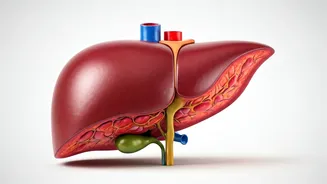Initial Body Reactions
When alcohol enters the system, the initial impact is swiftly felt, as it begins to course through your bloodstream. The liver, a critical organ, works
to metabolize the alcohol, yet the rate at which it can do so is limited. The body's initial response involves the central nervous system, where alcohol acts as a depressant. This explains why people often experience relaxation, reduced inhibitions, and impaired coordination shortly after consumption. Alcohol also impacts the digestive system, as it can irritate the stomach lining, potentially leading to acid reflux and nausea. Furthermore, alcohol has diuretic properties, which promote increased urination, causing dehydration. The short-term effects can be influenced by factors such as the amount of alcohol consumed, body weight, and individual metabolism.
Long-Term Health Risks
Regular or excessive alcohol intake significantly elevates the risks of several health issues. The liver, as the primary metabolizer of alcohol, is particularly vulnerable. Long-term heavy drinking can lead to conditions like alcoholic hepatitis, cirrhosis, and liver cancer. Alcohol also heightens the risk of cardiovascular diseases, including high blood pressure, stroke, and heart failure. Additionally, persistent alcohol consumption increases the likelihood of developing various cancers, such as those of the breast, colon, and esophagus. Beyond physical health, alcohol misuse is linked to mental health issues, like depression and anxiety. Prolonged alcohol abuse also affects brain function, potentially causing cognitive decline and memory problems. The severity of these risks increases with the amount and frequency of alcohol intake, underscoring the importance of mindful and moderate consumption.
Alcohol and Mental Health
The relationship between alcohol consumption and mental health is complex. While alcohol might initially seem to ease feelings of stress or anxiety, it can worsen these conditions over time. Alcohol interferes with the brain's neurotransmitter systems, which are essential for regulating mood and emotions. Consistent alcohol use can disrupt the delicate balance of these systems, potentially leading to or exacerbating mental health disorders. Individuals struggling with mental health issues may turn to alcohol as a form of self-medication, which can create a vicious cycle. Alcohol can also impair judgment, increase impulsivity, and affect decision-making, which can lead to risky behaviors. Furthermore, withdrawal from alcohol can trigger intense symptoms of anxiety and depression, making it even more challenging to manage mental health conditions. Awareness of these interactions is crucial for overall well-being.
Strategies for Moderation
Practicing moderation is essential for minimizing the health risks associated with alcohol consumption. One key strategy is to set clear limits on how much alcohol you consume and stick to those boundaries. It is helpful to be aware of standard drink sizes, as these can vary. For instance, a standard drink is typically considered to be 1.5 ounces of hard liquor, 5 ounces of wine, or 12 ounces of beer. Pacing yourself is another useful technique, involving sipping your drink slowly and alternating alcoholic beverages with water or non-alcoholic drinks. Eating food before and while drinking can slow the absorption of alcohol into the bloodstream, thereby reducing its immediate effects. Consider the social environment when drinking; avoiding peer pressure to drink excessively is important. If you find it difficult to moderate your alcohol consumption, seeking support from a healthcare provider or a support group can be highly beneficial.


















